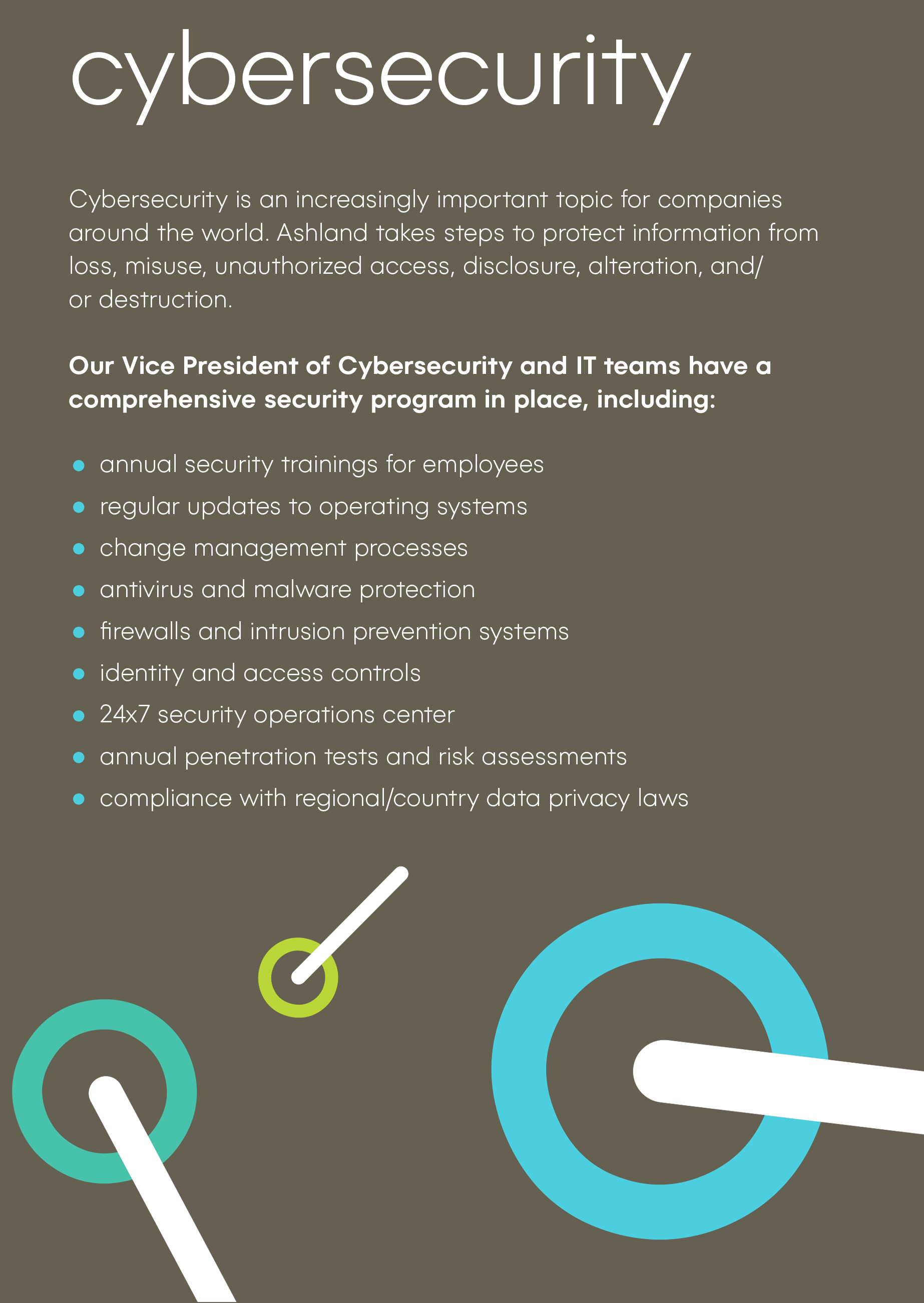oversight and committee efforts
At Ashland, we dedicate ourselves to earning the trust of our investors, employees, suppliers, and customers.
By fostering a culture that emphasizes compliance with the law and ethical business behavior and by adopting strong principles of corporate governance, our constituents can feel confident about their association with Ashland.
The cornerstone of Ashland’s compliance program is our Global Code of Conduct. We also have a strong and active preventive law program and apply strict ethical standards to our financial audit practices. Our system of corporate governance includes an independent board of directors and board committees composed entirely of independent directors as well as stock ownership guidelines for key employees.
At Ashland, we value the trust our constituents place in us, and we work every day to keep their trust.
audit committee
Ashland’s audit committee supports oversight of internal and external validation of ESG metrics and reporting. The committee actively monitors anticipated or known disclosure requirements that will impact future reporting of key ESG information.
The Audit Committee assists the Ashland Inc. Board of Directors in fulfilling its oversight responsibilities relating primarily to: (a) the integrity of the Company’s financial statements and financial reporting process; (b) the integrity and effectiveness of the Company’s internal control over financial reporting; (c) the performance of the Company’s internal audit function and independent auditors; (d) the independent auditors’ qualifications and independence, and the audit of the Company’s financial statements and effectiveness of internal control over financial reporting; (e) the Company’s risk management policies and processes; (f) the Company’s financial affairs; and (g) legal and regulatory compliance requirements.
The committee reviews and approves the report required by the rules of the Securities and Exchange Commission (“SEC”) to be included in the Company’s annual proxy statement. The committee maintains effective working relationships with – and open communication between – the Board, management, and internal and independent auditors.
compensation committee
Ashland’s compensation committee supports compensation tied to ESG performance and KPIs, including current and future compensation for the company sustainability progress.
The Compensation Committee of the Board of Directors of Ashland Inc. will assist the Board in discharging its duties related to executive compensation and succession and the adoption, amendment, and termination of employee benefit plans sponsored, maintained, or contributed to by Ashland Inc., its subsidiaries, and affiliates that are more than 50 percent owned by Ashland Inc. (hereinafter singly or collectively referred to as the “Company”).
The purpose of the Committee is to (i) oversee the adoption and administration of the Company’s compensation plans, in particular the incentive and equity-based plans; (ii) discharge the Board’s responsibilities relating to compensation of the Company’s executive officers (those executive officers deemed “officers” under Section 16 of the Securities Exchange Act of 1934, as amended) (“Executive Officers”); (iii) oversee the preparation of the annual report on executive compensation required by the rules and regulations of the Securities and Exchange Commission to be included in the Company’s proxy statement; (iv) oversee plans for executive development and succession; and (v) adopt, amend, terminate, merge, spin off, and transfer the employee benefit plans of the Company, including those that are and are not subject to the Employee
Retirement Income Security Act of 1974, as amended (“ERISA”), except as the committee otherwise expressly determines or applicable law otherwise expressly requires, the committee shall not act as a fiduciary with respect to any company Employee Benefit Plan subject to ERISA.
environmental health, safety, and quality committee
The EHS&Q Committee reviews ongoing implementation of sustainability efforts, including Ashland’s direct and indirect GHG emissions reduction efforts and sustainable sourcing initiatives.
Ashland Inc. is committed to operating our businesses safely and responsibly and in compliance with all regulations. The Company is committed to protecting the health and safety of its employees and the public and sustaining the quality of the environment for future generations. Ashland is also committed to producing and providing safe and quality products for our customers while protecting the health and safety of its employees and customers. Ashland is also committed to increasing its portfolio of sustainable products and solutions to better protect the environment and the communities within which we operate.
The primary responsibility for ensuring the Company’s compliance with applicable environmental, health, safety, and product safety laws and regulations is vested in the operating management of the Company.
The Company’s Board of Directors believes that the Company must continuously earn the trust and confidence of its employees, customers, shareholders, and neighboring communities and other stakeholders in its commitment to operating safely and responsibly.
To monitor such compliance and performance as well as EHS, Quality, and Environmental ESG (defined as sustainability topics covering sourcing, operations, and solutions) related issues affecting the Company, the Board has established the Environmental, Health, Safety, and Quality Committee. The Committee is appointed by the Board to review and oversee the Company’s EHS, Quality, Environmental ESG, and Compliance policies, programs, and practices; EHS and Quality audits; and any EHS, quality, or compliance issues that affect, or could affect, the Company’s employees, customers, shareholders, and neighboring communities.
governance and nominating committee
The G&N Committee supports ESG governance efforts, including communication, transparency, and oversight of Ashland’s ESG programs. The committee also supports community engagement and STEM initiatives.
The Governance and Nominating Committee will assist the Ashland Inc. Board of Directors in identifying qualified individuals to become Board members, in determining the composition of the Board and its committees, in developing and implementing the Company’s corporate governance guidelines, and in ensuring the independence of the Board as it exercises its corporate governance and oversight roles for the benefit of shareholders and the Company’s other constituencies, including, but not limited to, counsel to the full Board with respect to (A) Board size, organization, membership, and function, (B) Board committee structure, size, and membership, and (C) succession planning for the Board.
director independence standards
Pursuant to Ashland Inc.’s (“Company”) Corporate Governance Guidelines policy, at least two-thirds of the Company’s Board of Directors (“Board”) must be independent. No director will be deemed independent unless the Board affirmatively determines that the director has no material relationship with the Company, directly or as an officer, shareholder, or partner of an organization that has a relationship with the Company. The Board will observe and comply with all additional criteria for independence established by the New York Stock Exchange and other governing laws and regulations
risk management
enterprise risk management
Ashland has a risk assessment process to assess risks and opportunities for both near - and long-term.
The risk assessment process identifies key risk areas, including ESG and other impacts which could pose threats to business continuity. Additionally, the risk process encompasses a definition of the responsibilities of risk owners, functional experts, and independent verifiers.
Each risk type is managed and supported by functional organizations that are responsible for specifying corporate requirements and processes. These processes include the critical elements of leadership, people, risk identification and management, and continuous improvement.
In 2023, Ashland reviewed and identified several ESG-related risks tied to climate change, transitional risks and opportunities, and resource availability.
We continue to evaluate ESG-related risks in our enterprise risk assessment process to ensure that our risk identification and mitigation efforts are forward-looking and sustainable.




